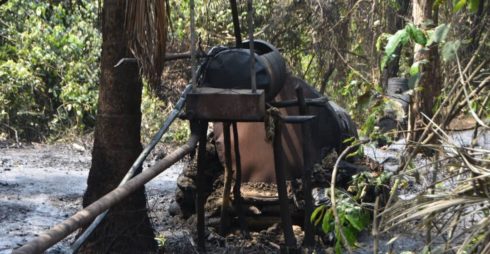Illegal refineries in Nigeria pose a severe threat to both human lives and the environment. According to reports by The PUNCH, from 2021 to 2023, at least 204 individuals lost their lives in explosions at these illicit sites. Workers at these locations often lack proper training and safety equipment, making them particularly vulnerable to accidents. These incidents not only cause immediate fatalities but also have long-term detrimental effects on the local communities and the country’s economy.
The harmful impact of illegal refineries extends beyond human casualties. The explosions and unsafe practices at these sites contribute to extensive environmental damage, affecting ecosystems and public health. Toxic substances released during the refining process contaminate air, water, and soil, leading to severe ecological degradation and health issues for nearby residents.
Why Illegal Refineries Persist Despite Crackdowns
Efforts to eradicate illegal refineries in Nigeria have been undermined by corruption and collusion among community leaders and security personnel. The Public Relations Officer of the Nigeria Security and Civil Defence Corps (NSCDC) in Rivers State, Olufemi Ayodele, highlighted that some community leaders conspire with operators of illegal refineries, allowing these sites to resurface after being destroyed. This complicity extends to conventional and private security agents, who are accused of accepting bribes or directly participating in the illegal activities.
Notably, the former President Muhammadu Buhari administration’s initiative to contract surveillance to Ekpemupolo, also known as Tompolo, faced criticism. Despite being tasked with monitoring pipelines and apprehending vandals, Tompolo was accused of fraternizing with illegal refinery operators. This example underscores the pervasive corruption that hampers efforts to eliminate these dangerous and unlawful operations.
Environmental Concerns and Sustainable Solutions
While security agents’ actions to destroy illegal refineries are commendable, environmentalists argue that burning these sites is counterproductive. The combustion process leads to oil spills that contaminate water bodies, destroy aquatic life, and pollute the air and soil. Ogun State’s Commissioner for Environment, Ola Oresanya, emphasized that burning illegal refineries exacerbates environmental degradation and is not a sustainable solution.
Experts suggest that the government should adopt a more stringent legal framework to combat illegal refineries effectively. Enacting and enforcing strict laws against operators and ensuring that security agents are adequately compensated could reduce corruption and improve enforcement. Additionally, experts advocate for cooperative ownership of natural resources involving federal, state, and community stakeholders. By giving local communities a stake in resource management, there would be a stronger incentive to protect and responsibly manage these resources, thereby reducing illegal activities.
Implementing these recommendations could significantly curb the menace of illegal refineries, protecting both lives and the environment while promoting sustainable development in Nigeria.
Environmental and Health Impacts of Illegal Refineries
Illegal refineries in Nigeria, primarily located in states like Abia, Imo, Rivers, Bayelsa, and Ondo, pose severe environmental and health risks to surrounding communities. Environmentalists warn that these operations lead to significant oil spills, contaminating water sources with hydrocarbons. This pollution renders water unsafe for drinking, washing, and irrigation, jeopardizing the health and livelihoods of local residents.
Moreover, the combustion of crude oil in these refineries releases toxic fumes that pollute the air, contributing to respiratory illnesses such as asthma and even lung cancer among nearby populations. The fires sparked by these illicit operations also ravage local ecosystems, destroying vegetation and displacing wildlife, exacerbating the environmental toll of illegal refineries.
Economic Sabotage and Government Response
Beyond environmental and health concerns, illegal refineries in Nigeria constitute a grave economic threat. Reports indicate that the nation loses approximately 10% of its daily oil production to these illicit activities, highlighting the scale of economic sabotage perpetrated by illegal refiners. The Nigerian National Petroleum Corporation (NNPC) has been actively combating this issue, revealing that it has deactivated about 6,800 illegal connections across oil-rich states between 2022 and the present.
Mele Kyari, the Group CEO of NNPC, underscored the persistence of this challenge, noting that while efforts to dismantle illegal refineries are ongoing, new connections continuously emerge, perpetuating the cycle of theft and economic loss. National Security Adviser Nuhu Ribadu echoed these concerns during his visit to oil facilities in Rivers and Abia states, lamenting that Nigeria loses an alarming average of 400,000 barrels of crude oil daily to oil thieves, further straining the nation’s economy and security.
.
Table of Contents
Discover more from OGM News NG
Subscribe to get the latest posts sent to your email.














